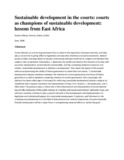Sustainable development in the courts: courts as champions of sustainable development: lessons from East Africa

View/
Date
2009Author
Kameri-Mbote, Patricia
Odote, Collins
Type
ArticleLanguage
enMetadata
Show full item recordAbstract
Courts function as an arm of government that is critical in the separation of powers doctrine, and they play a crucial role in giving effect to legislative and executive intentions and pronouncements. Judicial power enables sovereign states to decide controversies between itself and its subjects and between the subjects inter se (between themselves). 1 Judiciaries the world over balance the interests of society with economic development, environmental sustainability, and the competing interests of persons and entities. Sustainable development is defined as development "that meets the needs of the present without compromising the ability of future generations to meet their own needs." 2 Sustainable development requires mediation between the interests of current generations and those of future generations as well as between competing interests of current generations. Not surprisingly, the judiciary has been called upon in the quest for enforcing sustainable development policies owing to its traditional role in dispute resolution and interpretation of laws. As D. Kaniaru, L. Kurukulasuriya, and C. Okidi state:
The judiciary plays a critical role in the enhancement and interpretation of environmental law and the vindication of the public interest in a healthy and secure environment. Judiciaries have, and will most certainly continue to play a pivotal role both in the development and implementation of legislative and institutional regimes for sustainable development. A judiciary, well informed on the contemporary developments in the field of international and national imperatives of environmentally friendly development will be a major force in strengthening national efforts to realise the goals .
URI
https://litigation-essentials.lexisnexis.com/webcd/app?action=DocumentDisplay&crawlid=1&doctype=cite&docid=10+Sustainable+Dev.+L.+%26+Pol'y+31&srctype=smi&srcid=3B15&key=bd255355266858f8f7d317d463744356http://erepository.uonbi.ac.ke:8080/xmlui/handle/123456789/40469
Citation
Fall, 2009 Sustainable Development Law & PolicyPublisher
Department of Law, University of Nairobi
